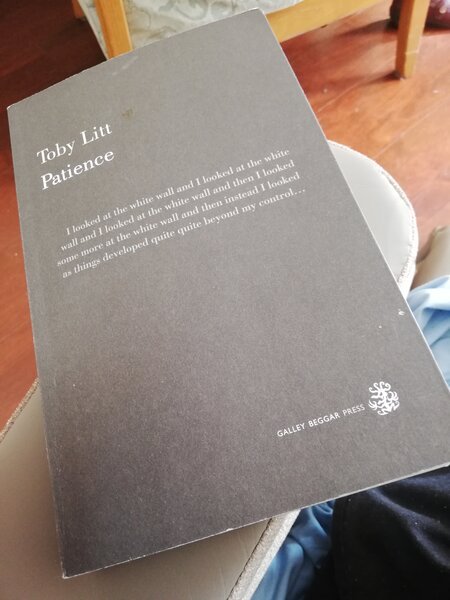Toby Litt, Ghost Story (2004)
 Toby Litt is an author I’ve intended to read for ages; his work is so varied that it’s hard to know where to start, so I just went for something from the middle of his career to date. I may not know Litt’s work that well, but I know enough to be wary of a novel that so blatantly declares its (ostensible) genre. And, indeed, Ghost Story is not a ghost story as you might imagine; its ‘ghosts’ are not the supernatural kind.
Toby Litt is an author I’ve intended to read for ages; his work is so varied that it’s hard to know where to start, so I just went for something from the middle of his career to date. I may not know Litt’s work that well, but I know enough to be wary of a novel that so blatantly declares its (ostensible) genre. And, indeed, Ghost Story is not a ghost story as you might imagine; its ‘ghosts’ are not the supernatural kind.
When first we meet Agatha and Paddy, she’s expecting, and they’re about to leave London for a new home on the south coast. After they’ve moved in, Agatha has given birth to Max, but miscarried his twin, which has affected her deeply (as it has Paddy, but Agatha is the novel’s main focus), and she becomes withdrawn. Effectively, Agatha comes to haunt (and is haunted by) her own house. Litt tells this story in a way that highlights its fictionality: long descriptive passages which create a sense of lassitude, dialogue which feels theatrical rather than naturalistic – and there’s a tension between this and the book’s emotions, which ring so true.
It seems to me that key to understanding Ghost Story is its fifty-page preface, in which Litt describes how he and his partner were themselves affected by three miscarriages. This memoir also includes a couple of fantastical sections; the sense here is that fiction can tell certain kinds of truth which non-fiction cannot. The story of Agatha and Paddy strikes me as a portrait of loss which lies beneath the surface of what’s told, and is perhaps all the more powerful for it.
Elsewhere
Toby Litt’s website
Some other reviews of Ghost Story: Reading Matters; Joanna Briscoe for The Guardian.
Stuart Evers, If This Is Home (2012)
 The author of last year’s excellent Ten Stories About Smoking returns with his first novel, which continues to explore how life may fall short of one’s dreams. Evers’ protagonist is Mark Wilkinson, who escaped his life in Cheshire and made it in America as ‘Joe Novak’; when we meet him in the early 2000s, he’s in Las Vegas , selling apartments at the ultra-high-end Valhalla complex. Alternate chapters chronicle a day in 1990 when Mark’s teenage girlfriend Bethany Wilder became a reluctant beauty queen at a parade, shortly before she and Mark were planning to leave for New York. But Bethany is nowhere to be seen in Mark’s present life – what happened becomes clear about halfway through the novel, when an incident moves Mark to return to the UK and catch up with the people and places of his own life.
The author of last year’s excellent Ten Stories About Smoking returns with his first novel, which continues to explore how life may fall short of one’s dreams. Evers’ protagonist is Mark Wilkinson, who escaped his life in Cheshire and made it in America as ‘Joe Novak’; when we meet him in the early 2000s, he’s in Las Vegas , selling apartments at the ultra-high-end Valhalla complex. Alternate chapters chronicle a day in 1990 when Mark’s teenage girlfriend Bethany Wilder became a reluctant beauty queen at a parade, shortly before she and Mark were planning to leave for New York. But Bethany is nowhere to be seen in Mark’s present life – what happened becomes clear about halfway through the novel, when an incident moves Mark to return to the UK and catch up with the people and places of his own life.
There are some striking and well-handled shifts of tone in If This Is Home. In the opening chapters, the Valhalla complex seems almost to belong in a more heightened reality, which contrasts sharply with the down-to-earth nature of the Cheshire-set sequences. Later on, the novel starts to turn on Mark’s character and, balances reality with a slight unreality in a different way – yet If This Is Home always feels a cohesive whole. Evers examines the difficulties of fitting in, leaving and returning; and shows how an individual can simultaneously have no options and all the choice in the world.
Elsewhere
Stuart Evers’ website
Evers interviewed on Nikesh Shukla’s Subaltern podcast.
Some other reviews of If This Is Home: Julie Fisher for Bookmunch; Dog Ear Discs; David Whelan for Litro.
Like this:
Like Loading...

 Toby Litt is an author I’ve intended to read for ages; his work is so varied that it’s hard to know where to start, so I just went for something from the middle of his career to date. I may not know Litt’s work that well, but I know enough to be wary of a novel that so blatantly declares its (ostensible) genre. And, indeed, Ghost Story is not a ghost story as you might imagine; its ‘ghosts’ are not the supernatural kind.
Toby Litt is an author I’ve intended to read for ages; his work is so varied that it’s hard to know where to start, so I just went for something from the middle of his career to date. I may not know Litt’s work that well, but I know enough to be wary of a novel that so blatantly declares its (ostensible) genre. And, indeed, Ghost Story is not a ghost story as you might imagine; its ‘ghosts’ are not the supernatural kind. The author of last year’s excellent
The author of last year’s excellent
Recent Comments